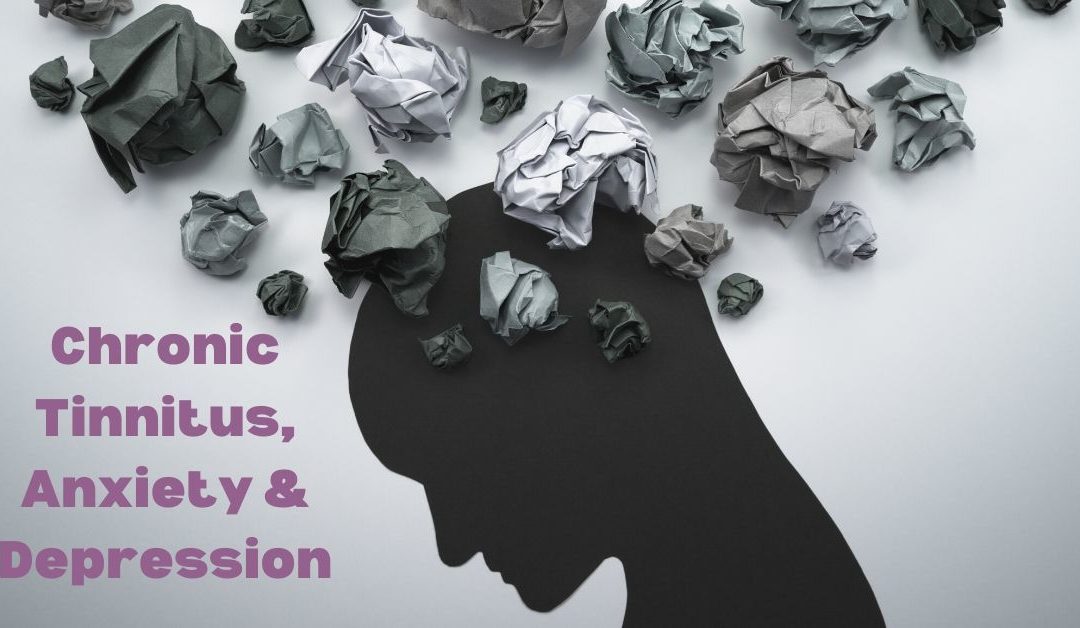Tinnitus, that annoying ringing or buzzing sound that only you can hear, affects millions of Americans. Just because no one else can hear the sound, doesn’t mean you’re going crazy. Tinnitus may be all in your head, but it has a big impact on your overall health, and tinnitus is closely linked to anxiety and depression.
What is Tinnitus?
Tinnitus is different for every person, and can range from a passing annoyance to a constant sound that makes it hard to focus on tasks, relax, or fall asleep at night. Tinnitus is a sound that only you can hear, and you’ll usually hear it when everything around you is quiet. People have described tinnitus as a buzzing, ringing, roaring, whistling, or squealing noise.
Tinnitus can be temporary. For example, if you’ve ever left a loud concert or sports event with a ringing in your ears, you’ve felt the effects of temporary tinnitus. Tinnitus can also be permanent. Many people experience tinnitus every day. For some people, tinnitus is a constant irritation that can cause a lot of anxiety.
The Link Between Chronic Tinnitus and Anxiety
Chronic tinnitus often leads to anxiety. When you experience tinnitus on a daily basis, this sound can make it hard for you to concentrate at work, or enjoy conversations with loved ones. When you experience tinnitus in the evening, when the house is quiet, it can disrupt sleep, and prevent you from getting the rest you need.
Tinnitus and stress are closely linked. When you experience tinnitus, you’ll feel your stress and anxiety levels rise. This will affect your tinnitus, and the more anxious you feel, the more noticeable your tinnitus will become. More tinnitus leads to even more stress! Chronic tinnitus and anxiety are closely connected, and this negative cycle can have a major impact on your mental health. People with chronic tinnitus are more likely to have anxiety, depression, insomnia, and other sleep disorders.
Studying Tinnitus, Anxiety & Depression
A recent study published in the International Tinnitus Journal in 2017 shows that those with chronic and ongoing tinnitus have much higher rates of both anxiety and depression than people without tinnitus. The more discomfort you feel from your tinnitus, the more likely you are to experience anxiety, poor sleep, and depression.
Researchers found 80 participants for the study, all of whom had chronic tinnitus. On average, the participants in the study had been living with tinnitus for almost 7 years. Of the 80 participants, 45% of participants suffered from anxiety, and 21% from depression.
Treating Tinnitus
It’s estimated that 10-20% of the population has tinnitus. While many of these cases are mild or temporary, many Americans suffer from chronic, ongoing tinnitus. They risk higher rates of anxiety and depression, as well as sleep disorders or insomnia. There is no cure for tinnitus, but there are several effective treatment options.
Tinnitus affects each person differently, but there are some common ways to treat tinnitus. The most effective treatment option is sound therapy. With sound therapy, sounds or music will mask tinnitus, and bring you relief from the constant sound in your ears. Have you slept with a noisy fan in your room to drown out tinnitus, or taken a nap on the couch with the TV on softly? This works in the same way as sound masking, and blocks out the tinnitus sounds that you hear.
Modern hearing aids often include tinnitus therapy programs that help you manage your tinnitus. These programs will be calibrated to match your exact tinnitus, playing sounds at the right frequency to mask your tinnitus. You can choose between a variety of sounds to find what works best for you. Tinnitus therapy programs include white noise, pink noise, nature sounds, or even music.
Seeking Treatment for Hearing Loss Could Help Alleviate Tinnitus
In the study linking tinnitus with anxiety, researchers found that only 16% of participants with tinnitus had normal hearing. The majority of those with tinnitus also had hearing loss. Treating hearing loss, along with treating tinnitus, will help minimize the impact of tinnitus on your life. When you can hear more of the sounds around you, and hear clearly, your tinnitus will fade into the background, and you can enjoy your day without worrying about tinnitus.


